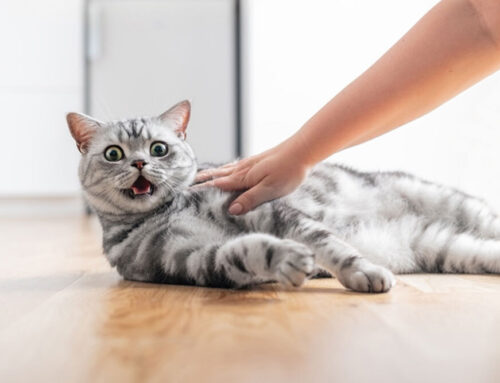Cats are excellent at hiding—mice under pillows, hairballs in your shoe—and they make themselves scarce when their owners pull the cat carrier out. Something else they’re great at hiding: signs of disease and illness.
To keep tabs on your cat’s health and prevent disease, annual wellness exams are key. Routine preventive care can help us identify hidden signs of illness, which gives us the opportunity to begin treatment earlier, giving your feline friend a better chance at living a long, healthy life.
Steps to a lifetime of wellness
Wellness care involves prevention, diagnosis, and treatment. The goal of a wellness plan is to prevent disease, but sometimes that’s impossible to do, even with the most thorough and high-quality veterinary care. If disease does strike, regular wellness care will help us to diagnosis it early and begin the appropriate treatment right away.
PREVENTION
At an annual wellness exam, many topics are discussed, including:
- Nutrition and weight — Nutrition and weight can be big indicators of an animal’s overall wellness. If your cat has stopped eating her favorite crunchy kibble and is losing weight, dental disease, stress, pain, or a metabolic imbalance could be contributing factors. On the other hand, if your cat screeches at you in the middle of the night to refill her food dish and has a “house-cat belly” developing, she likely needs a diet adjustment. Low-calorie, high-fiber food can help keep your ravenous feline satisfied so she can lose that tummy before joint, grooming, or diabetic issues occur.
- Activity level and behavioral changes — Changes in activity level or behavior are often silent signs of pain. If your cat seems lazier than normal or doesn’t want to jump onto the windowsill or furniture, she could be suffering from arthritis or other musculoskeletal pain. Painful kitties tend to avoid family time, don’t enjoy being petted or groomed, and can become grouchy.
- Litter box habits — A change in litter box habits can indicate a number of underlying medical or behavioral issues. Cats are quite finicky creatures, and they can be easily disturbed by stress in the household, a change in litter, a disliking of the type or size of the litter box, or a multitude of other behavioral components. Some medical reasons for changes in litter box habits include:
- Parasites
- Gastrointestinal imbalances
- Disease processes
- Improper diet
- Urinary tract infections
- Arthritis pain
A closer look is necessary if your cat is eliminating inappropriately or if there’s an abnormality in the contents of the litter box.
- Vaccinations and parasite control — The cornerstones of feline wellness, vaccinations and parasite control will depend on your cat’s specific lifestyle. When determining your cat’s preventive protocol, we’ll consider:
- Does she live indoors only, or does she also spend time outside?
- Does she hunt and eat rodents or birds?
- Are there other pets in your household?
- Do you live in a rural, suburban, or urban environment?
DIAGNOSIS
Your veterinarian is your best resource for determining what, if any, issues your furry friend may have. A thorough physical exam and medical history provides a lot of information about your pet’s health. If a disease or illness is suspected, we may recommend testing to confirm a diagnosis. Diagnostic testing can include:
- Blood work
- Radiographs
- Urinalysis
- Fecal analysis
- Electrocardiogram
- Ultrasound
- CT scans and MRIs
- Histopathology
- Cytology
- Culture and sensitivity
Not all of these diagnostic tests can be performed in-house; in some cases, we may need to refer you to an outside laboratory or specialist.
TREATMENT
Once a definitive diagnosis is made, a plan of action is created. The complexity can range greatly for treatment plans. If your pet is healthy, the plan can be as simple as returning biannually for routine senior blood work to monitor kidney function, applying flea prevention to avoid flea allergy dermatitis, and administering the appropriate vaccinations. If a disease process is discovered during testing, the treatment plan can become more complex and might involve medications, supplements, changes in diet or home environment, and follow-up veterinary care.
You love your cat, and you want to prevent illness and catch disease at the earliest stage possible. Do that by providing routine preventive care exams. Call us at 256-859-2221 to schedule an appointment for your favorite feline.








Leave A Comment